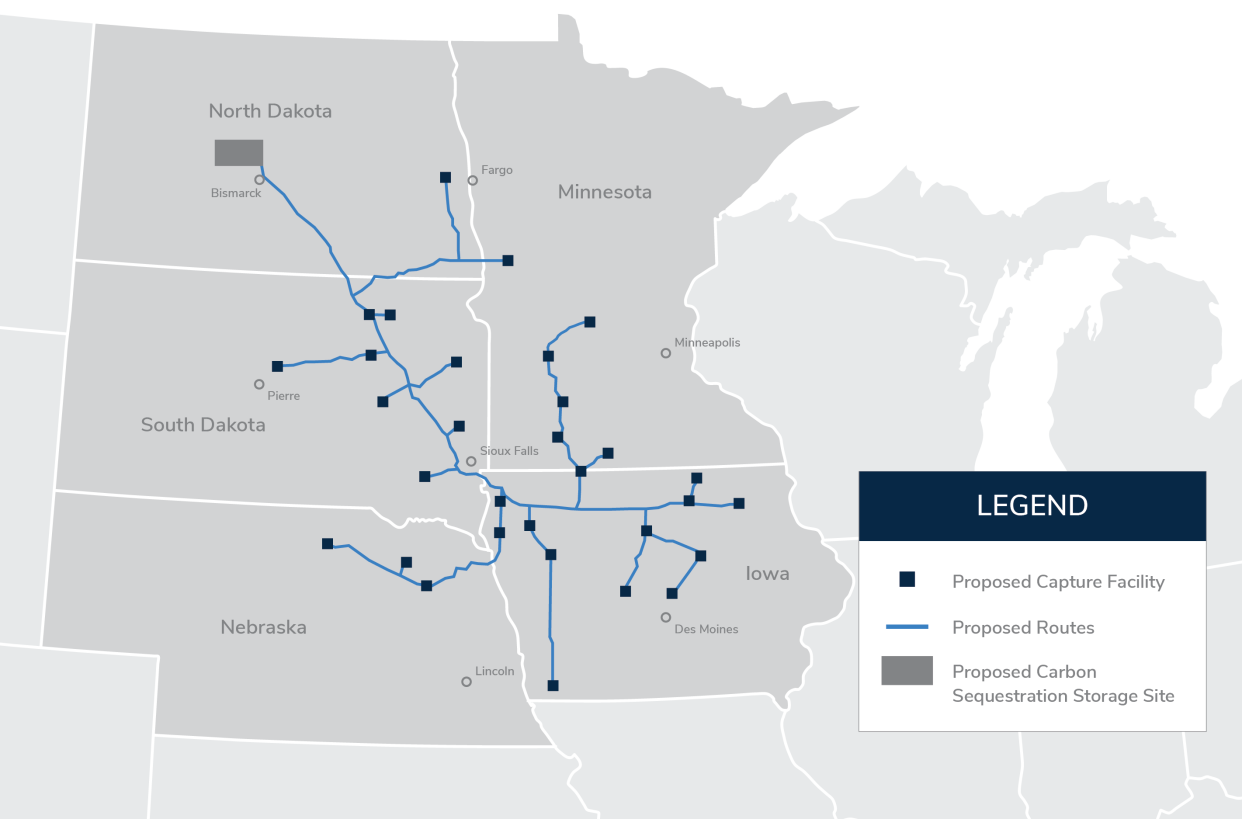Summit Carbon would need written consent to perform land surveys under new SD bill

A bill changing one of South Dakota's property access laws could shift power toward landowners affected by Summit Carbon Solutions' proposed multi-state pipeline network.Rep. Scott Moore and Rep. Karla Lems introduced House Bill 1079 on Thursday. The bill, if passed, would mandate that those proposed pipeline and similar projects would also need to obtain written consent from property owners for surveyors to enter their lands.
It's one of the first bills introduced this session that was created in response to Summit Carbon Solutions' controversial carbon dioxide sequestration project in South Dakota.
Currently, persons or organizations with eminent domain authority are able to access private property to conduct land surveys or examinations with or without permission if certain criteria are met.
This includes:
having an active siting application with the South Dakota Public Utilities Commission;
providing 30-day written notice, including the filing and expected dates of entry, to the owner and any tenant in possession of the private property;
and making a payment to the property owner, or provide sufficient security for the payment, for any actual damage done to the property by the entry.
But, under the proposed amendment, energy groups would also need to obtain written consent from landowners permitting access to their property at the scheduled date and time.
If all four criteria are not met, the PUC would have to approve the energy project's permit application for surveys to take place.
This bill would directly affect companies like Summit Carbon, an Iowa company proposing to build a 2,000-mile, $5.5 billion pipeline through South Dakota and four other states. More than 400 miles of the pipeline would run through eastern and northeastern South Dakota if the project is completed.
Pipeline and similar companies use the results from surveys and examinations to determine whether the lands along their transmission project's route can safely and adequately host new infrastructure.
HB 1079 was spurred by lawsuits filed by landowners in Brown, Edmunds, McPherson and Spink counties in 2022. The landowners sued Summit Carbon to prevent the Iowa company from accessing their property to conduct surveys to route their pipeline.
However, a South Dakota judge ruled in Summit Carbon's favor in April and granted the company the right to access the property owners' lands without permission. The company later followed through on those land surveys, sparking criticism from property rights advocates, affected landowners and some legislators.
More: Senator Mike Rounds: Summit Carbon gave itself a 'black eye' after controversial land surveys
Landowners have since appealed the decision to the South Dakota Supreme Court. It remains to be decided whether the judicial tribunal will pick up the case, as Summit Carbon initiated a motion in December to have the case dismissed.
Bruce Rastetter, CEO of Summit Ag Group, Summit Carbon's parent company, told Bloomberg in October the project would be delayed until early 2026. This news came a little more than a month after the South Dakota Public Utilities Commission unanimously denied the company's permit application for their Midwest Carbon Express pipeline.
Lems, Moore and Rep. Jon Hansen also teased two other pieces of pipeline-related legislation Monday, ahead of the 99th South Dakota Legislative Session that started Tuesday.
One of those is a bill which would prevent "condemnation of property owners before a permit is granted by the PUC."
Condemnation actions are among the "sting[s] of eminent domain abuse," as Lems described Monday, that have threatened South Dakota property owners.
In April, Summit Carbon filed more than 80 condemnation lawsuits against property owners who refused to sign easement agreements to acquire their land through eminent domain, as the Argus Leader first reported. Another 80 were brought at a later date, but the company later vowed to dismiss all 160 proceedings against the landowners.
More: South Dakota legislators aiming to find 'compromise' in CO2 pipeline bills
Based on previous Argus Leader reporting, lawmakers are anticipating the introduction of similar bills with likely lighter restrictions on carbon dioxide sequestration and other projects than those drafted by Moore and Lems. However, they have yet to be introduced this session.
House Bill 1079 has yet to be heard before the state House of Representatives.
Summit Carbon Solutions declined to comment for this article.
This article originally appeared on Sioux Falls Argus Leader: Summit Carbon would need written consent to perform surveys under new SD bill

